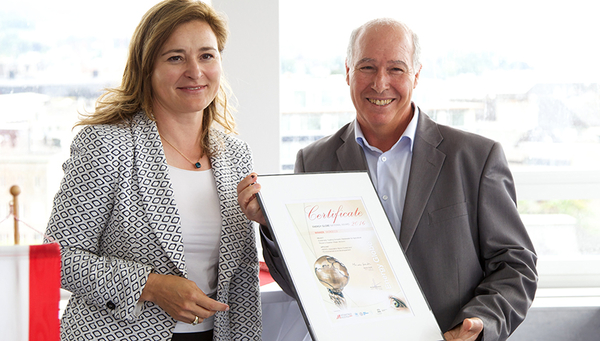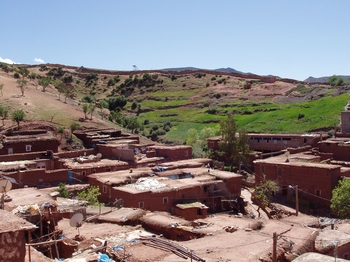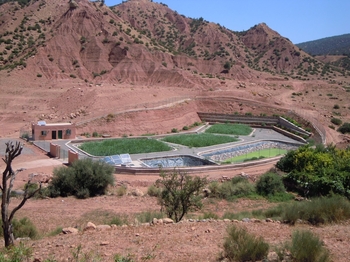Archive detail
Bouziane Outiti wins Energy Globe Award for wastewater treatment project
June 2, 2016 |
Bouziane Outiti, the Energy Globe Award winner, has worked at Eawag for 28 years – not as a researcher, but as an IT professional. Eight years ago, Moroccan-born Outiti founded AMSED, the “Association Maroco-Suisse pour l’Environnement et le Développement”. The association aims to support Morocco’s nationwide efforts to address the country’s water-resource issues.
You’re an IT specialist, but you launched a wastewater treatment project – how did that come about?
As I grew up in Morocco, I’m very familiar with the sanitation issues, especially in rural areas. The country’s water and wastewater problems are so serious that they cannot be resolved by the efforts of the Moroccan government and civil society alone. In the light of my experience at Eawag, I set up AMSED in 2008. This association provides a platform enabling international experts to support water supply and wastewater treatment projects in Morocco. The wastewater treatment project in Asselda arose more by chance – it was initiated by a student who encountered the village’s wastewater issues in the course of her Master’s thesis.
Can you describe the background to the project, the villagers’ wastewater problems?
The two villages Asselda One and Asselda Two (their actual names!) lie 50 kilometres to the south of Marrakech and are part of the community of Asni, in the foothills of the High Atlas Mountains. The population of around 1200 originally had only a rudimentary drainage system: wastewater flowed directly into the agricultural zone (fruit plantations) and the nearby river. You can imagine the impact that had on people’s health. But for our project, this also offered an opportunity to develop the best possible wastewater treatment system for this environment. Thanks to the generous funding provided by the Drosos Foundation in Zurich and extensive administrative support from Eawag, we were able to realize the project with our Moroccan partners.
What exactly did this work involve?
It was originally planned as a three-year project, but it actually took six years. Our local project team consisted of a young Moroccan engineer and her administrative assistant, collaborating with the provincial government, the communal authority, a Moroccan construction firm and the village association (a widely established institution in Morocco). In Switzerland, it might not seem unusual for a project of this kind to be managed by two women – but that’s not the case in a male-dominated Berber environment such as Asselda. In villages like these – often subject to ethnic or local political conflicts – communication problems will always arise. So it’s extremely important that a project involving foreign experts should treat the local community with respect. Here, because of my Berber background, I often – no, very often (laughs) – acted as an intermediary.
A challenging job. What kind of wastewater treatment system is now in place?
Over the past five years, we’ve developed a facility where wastewater is treated and the treated water can be used to irrigate fruit trees. Our system involves a combination of a constructed wetland and a storage pond. With the exception of the self-priming siphon for batch feeding of the green filter and the solar pump for irrigation of the fruit plantations, the facility does not require mechanical equipment or external energy supplies. The system is largely odour-free. This combination of processes is a novelty in Morocco, and the prototype in Asselda has already been visited by a lot of other communal authorities interested in building treatment systems of this kind.
One project leads to another: what are the next steps?
The system has been completed and has been operating successfully since February 2015. Monthly water analyses have been carried out over the past eight months. The performance of the system is in line with our expectations, and the effluent meets the WHO quality guidelines for the irrigation of fruit trees. Duties have been defined for the operation and maintenance of the treatment facility and the drainage system. The village association officials and the maintenance technician responsible know what tasks have to be performed. But another important – and delicate – step has still to be taken – the handover of the system to the communal authority and thus the transition to routine operation and the associated responsibility and budgeting for system operation and maintenance. Especially for projects in rural areas, this often involves a certain risk. But we have good local partners to help ensure that the wastewater treatment facility will continue to be well managed in the future, further improving the lives of the local community.
Apart from your final intermediary activities, will there also be time to celebrate the success of the project?
Of course! We’re delighted about the Energy Globe Award – nobody expects to win a prize like that when you start out on a project. We’re immensely proud of what all the participants have achieved – especially our female Moroccan project managers, who brought this project to a successful conclusion in such a male-dominated world. We’ll certainly be celebrating when the facility is officially inaugurated – maybe even at the COP meeting in Marrakech in November.



